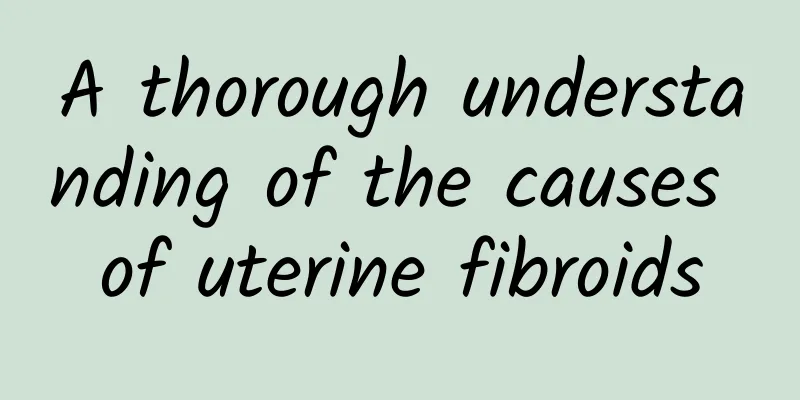Briefly explain: Three common uterine fibroid surgeries

|
Uterine fibroids are a gynecological disease that requires timely treatment, and uterine fibroid surgery is a very good way to treat uterine fibroids, and it has a very good effect on uterine fibroids. What are the common uterine fibroid surgeries ? The following is a brief introduction to the common uterine fibroid surgeries. Common surgeries for uterine fibroids include: 1. Uterine fibroid ablation: Radiofrequency ablation is a thermal destruction technology that has developed rapidly in recent years. This type of uterine fibroid surgery is a high-frequency electromagnetic wave that can produce a warming effect of 60 to 90 degrees Celsius. Under the guidance of B-ultrasound, the radiofrequency treatment source is accurately inserted into the lesion site through natural cavities such as the vagina and cervix. It acts on the tissue, causing the tissue temperature to rise and produce high fever, causing irreversible coagulation, degeneration, and necrosis, and finally being absorbed and discharged by the body, thereby achieving the purpose of treatment. The therapeutic amount of electromagnetic waves has no effect on the patient and the operator. This type of uterine fibroid surgery is simple, safe, and mildly traumatic. The treatment time is short, no hospitalization is required, the effect is definite, the cost is low, and it is easy for patients to accept. 2. Vaginal uterine fibroid surgery: It is also a common uterine fibroid surgery. With the deepening of the concept of minimally invasive surgery, vaginal surgery for uterine fibroids has also been included in the ranks of minimally invasive surgery, on par with gynecological laparoscopic surgery. Vaginal uterine surgery is most commonly performed in uterine myomectomy and hysterectomy. 3. Endoscopic uterine fibroid surgery: 1. Laparoscopic hysterectomy: The advantages of this type of uterine fibroid surgery are less trauma, fewer complications, shorter hospitalization time, preservation of the integrity of the abdominal wall, faster recovery of gastrointestinal function, and less interference with the pelvic and abdominal environment. 2. Hysteroscopic myomectomy: If the uterine fibroids are located under the uterine mucosa, it is medically called submucosal uterine fibroids. This type of uterine fibroid surgery is suitable for using hysteroscopic electroresection to remove the submucosal uterine fibroids. The above is an introduction to common uterine fibroid surgeries. I believe everyone has some understanding of this. Patients should choose the uterine fibroid surgery that suits them according to their actual condition and should not choose blindly. |
<<: The most important factors causing pelvic inflammatory disease
>>: Introduction to six common symptoms of uterine fibroids
Recommend
What is cervical nabothian cyst?
Cervical nabothian cyst is a common gynecological...
What are the common causes of vulvar leukoplakia in traditional Chinese medicine?
What are the common causes of vulvar leukoplakia ...
What foods can prevent cervical erosion?
What foods can prevent cervical erosion? First: F...
How to detect pelvic effusion
Pelvic effusion is a very common gynecological di...
Can bacterial vaginosis cause dysmenorrhea?
Can bacterial vaginosis cause dysmenorrhea? 1. Ba...
What should I do if I have uterine fibroids? What are the dietary treatments for uterine fibroids?
Uterine fibroids are common conscientious tumors ...
Does not eating starch help you lose weight?
For many people who are trying to lose weight, st...
Why do women have premature ovarian failure?
The ovaries are the reproductive organs of women,...
Enzyme food combination method to transform into a body that is easy to lose weight
There has been a wave of "enzyme weight loss...
A brief discussion on endometrial tuberculosis
Endometrial tuberculosis often follows pulmonary ...
How to treat premature ovarian failure, 3 clinical treatments for premature ovarian failure
Premature ovarian failure (POF) refers to insuffi...
Can ectopic pregnancy be contagious?
Is ectopic pregnancy contagious? Ectopic pregnanc...
Specific causes of cervicitis
The onset of cervicitis is relatively common in l...
What are the most common causes of cervicitis?
It is very painful for women to suffer from cervi...
Do you know what symptoms of adnexitis are?
What are the symptoms of adnexitis? What symptoms...









